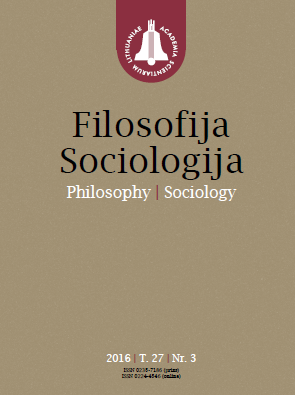Individo siekiai ir vertybių pasirinkimas
Individual aspirations and the choice of values
Author(s): Valdas PruskusSubject(s): Epistemology, Ethics / Practical Philosophy, Social Philosophy, Communication studies, Social Theory
Published by: Lietuvos mokslų akademijos leidykla
Keywords: individual; society; values; rational choice; rate; standard;
Summary/Abstract: Our activities in respect of good (value) might be motivated variously; however, they are always purposeful and rational because of reaching of the result, which would give satisfaction. There exist two types of the theories explaining values and their importance for the individuals as well as for the society. So-called monistic theories for explaining values appeal to one basis (material or spiritual), in contrast to pluralistic theories. According to the monists, the fundamental characteristic of the value is its goodness. In other words, the value is always related with a certain good. In turn, good can be perceived in two ways: 1) like a sum of appropriate standards defining the object, in pursuance of which it is possible to reach the task; 2) like our view of this object, for which we are minded to give a special value and importance. There exist two main directions (versions) of the monism-hedonism and theory of rational desires (objectives) in explaining values. According to the hedonists (J. Narveson, J. Kupperman) goods (good) are what gives a pleasure. If they do not do that, they are not the values. Therefore goods (good) which can give a pleasure always will be authentic and we will always reach for them. Meanwhile from the point of view of the supporters of rational desire theory (F. Griffin, B. R. Brandt, P. Railton), first of all, goods (good) are what could be rationally grounded (with arguments of mind) (according to the clearly defined standards for the values good). In other words, the actions should be carried out with pleasure not because they are pleasant for us but because they can be based on the arguments of mind.
Journal: Filosofija. Sociologija
- Issue Year: 2016
- Issue No: 3
- Page Range: 199-205
- Page Count: 7
- Language: Lithuanian

